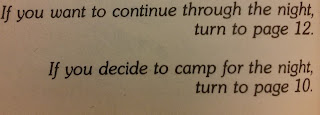While visiting the educational resources section of the Ball State library the other day with one of my boys, I saw a pair of Choose Your Own Adventure books—easily recognizable to me by the red banner on the spine after not having seen one in many years.
I checked out Lost on the Amazon by R. A. Montgomery and brought it home to show my six-year-old son, who is an avid reader. He seems to have no trouble with the How to Drain Your Dragon and Captain Underpants series of books, and I thought a classic CYOA might be fun for him.
When I brought it home and explained what it was, he was uninterested. I brought it up a few times during the past two weeks, but he didn't show any interest until we sat on the couch together yesterday afternoon and read it together.
I will summarize our story. We were a doctor whose friends had gone missing on the Amazon River. When we find this out, we have to choose to immediately go up the river with the "Indian" Owaduga, charter a plane and go to the last known location of our friends, or wait three days to go upriver with a group of police and soldiers.
We chose to trust the Indian, and he took us in his dugout canoe up the river. As dusk approached, Owaduga gave us a choice:
We decided to rest a while, so we set up camp on the shore. Then, ...
The bold serif The End was as memorable to me as the red logo. Through no faulty reasoning or logic, we ended up being eaten by piranhas. I explained to Alex that CYOA books are like Faster Than Light: you play for the fun of playing, always with a hope of winning, but usually dying.
However, this discussion was not my first response: my first, internal reaction was to flip back to the previous decision and try again. In fact, I felt it in my fingers: I remembered how I used to keep a finger on the previous page so that I could easily backtrack.
That is, I used quick save.
I had last read a CYOA book some time in the 1980s. At the time, I was also playing games at the arcade, on the Commodore 64, and on friends' Atari machines. The arcade machines were quarter-eaters of course, and the few home computer games that had any save mechanisms were anything but "quick." (Trigger the sound of a 1541!) I have recently been thinking about the implications of digital quicksave-quickload systems on modern consciousness, knowing that experiences with technology can change the structure of the mind. However, here is evidence—long buried in my mind and perhaps inaccessible without the mediation of holding and reading this book—that my experience with quicksave-quickload predates their digital incarnation by about ten years.
My son and I read through two more times, both resulting in death by poison arrows. He tried to read it again that night, and when I asked him about it, he said he "kept getting lost." It's not that he was lost in the Amazon—he was forgetting that he couldn't just read page by page and had to follow the instructions at the bottom! This morning, he tried the plane for the first time, and he ran excitedly into my office, saying, "I survived!" Turns out, he got stranded and had to await the River Patrol: he didn't actually find his lost friends, but he had also not died, which to him was an epic win.




I have a box of about 80 of these books. They were my first addiction. (I don't know that I could pinpoint my second.)
ReplyDeleteThis quicksave approach was great when my "choice depth" was shallow, but my little fingers got overwhelmed. I developed a bookmarking system to track all of my choices. Each bookmark was numbered: 1 through N. When I reached a choice, I inserted the next bookmark in sequence. When I reached an end, I returned to the highest-numbered bookmark, or my most recent choice. I was able to traverse all the plot paths this way. Later, in college, I realized that I had implemented depth-first search with my own backtracking system. If only I'd started counting at 0...
I remember reading about one of the books that had an end that wasn't reachable. A lonely orphan node. My algorithm wouldn't have caught this.
All this is to say that I agree. I think our tendency to lay out breadcrumbs was not something technology taught us. Technology makes it easy to revert to an earlier state. The ability to turn back the clock -- which we've long sought in real life -- is attainable. And perhaps the need is even greater with technology, which accelerates our ability to make (and fix) mistakes.
Ha, great story about analog DFS!
DeleteThe book you're thinking of is "Inside UFO 54-40," which has no normally-reachable win condition. I learned about this one from one of my favorite Raph Koster essays: http://www.raphkoster.com/2012/01/20/narrative-is-not-a-game-mechanic